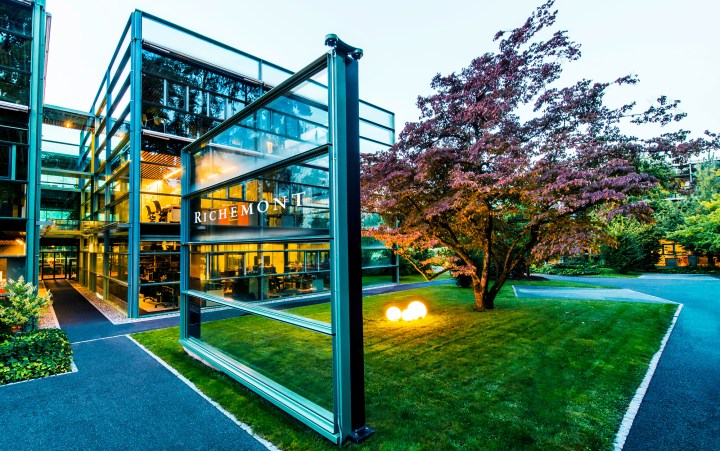BUSINESS REFLECTION
After the Bell: Time will tell the future of Richemont

The French luxury goods giant LVMH is rumoured to be interested in a takeover of Richemont. The story originated in a Swiss publication called Finanz und Wirtschaft, which proposed the idea in a rather elegant way, saying the idea was still ‘little more than a whisper’. Both sides refused to comment. (Major alert!)
What is the worst phrase in journalism? That’s a hard question — there are so many of them. One of my least favourite is the very frequently abused phrase, typically used at the end of a story, “whether (blah blah) happens, only time will tell”. You might as well end the story by saying, “the time you have been reading this article has been completely wasted and you will never get it back, because I have no clue what is going to happen, so I’m just going to kick for touch and conclude elliptically that the mysterious entity ‘time’ will inform us in due course”.
And actually, as it happens, time doesn’t tell you anything. Events transpire. They have consequences. And that happens over time. But time itself is not necessarily a determining factor. The mere passing of time may very well tell us nothing.
The same applies to the phrase “It remains to be seen”. In fact, I’ve actually seen the two combined, with the endpiece, “It remains to be seen and only time will tell.” That is really laying on the equivocation with a trowel.
Another phrase we see a lot is “according to people familiar with the” situation/deal/event/matter. You see this often in news reports from wire services like Bloomberg and in formal newspapers like the Wall Street Journal. I’m intrigued by the assumptions here. It’s so useful and refreshing to know that the person being quoted or interviewed is familiar with the situation. I mean, normally, one would just talk to anyone and slam their view on the record. But in this particular case, the person concerned is special because they have actual knowledge. Isn’t that a relief? It’s so reassuring. And helpful.
The reason this phrase in particular appears is that typically there has been a behind-the-scenes deal between the person with the said familiarity and the journalist. The source of the comment doesn’t want his or her name mentioned and the journalist doesn’t want to let that little triviality get in the way of an important story. So there is a compromise; the source remains unnamed, but the journalist has to indicate that this information isn’t completely arbitrary, it comes from someone “familiar with the situation”. It’s the way of the world.
In the old days, journalists would just say blah, blah fishpaste, “sources said”. But somewhere along the line that was deemed too generic, and hence the birth of “people familiar with the situation” or “people with knowledge of the deal”.
When you read these locutions, you can bet one of two things has happened: an external public relations officer has been authorised by the company to make a discreet statement, but might confuse the issue if the speaker was identified. Or a banker involved in the deal is flying a kite to see whether the market likes the idea, but doesn’t want blowback if the market hates the idea, so the information is passed to the journalist on the QT.
Visit Daily Maverick’s home page for more news, analysis and investigations
Anyway, it’s a good rule of thumb to distrust any comment in the press which doesn’t have a name behind it, because if there isn’t, there is a good chance someone is trying to manipulate someone else. What you have to be sensitive to is when no one says anything, because in that case, the chances something is actually happening are extremely high.
This all crossed my mind recently because last week the French luxury goods giant LVMH was rumoured to be interested in a takeover of Richemont. The story originated in a Swiss publication called Finanz und Wirtschaft, which proposed the idea in a rather elegant way, saying the idea was still “little more than a whisper”. Both sides refused to comment. (Major alert!)
Astrid Wendlandt, the editor of a very influential luxury goods website, Miss Tweed, quickly responded to the report, saying it was “fake news”, noting the market didn’t take it seriously and Richemont’s shares hardly moved.
So that’s that, you might think. Not so fast, for these reasons:
First, LVMH is so huge, it towers over Richemont. The market capitalisation of LVMH is $420-billion compared to Richemont’s $88-billion. But Richemont and its brands are big enough to make a meaningful difference to LVMH. So the size difference makes sense; large enough for LVMH to want, but small enough to be easily financeable.
Second, LVMH bought US jewellery maker Tiffany for $16-billion which closed in 2021, and by all accounts, the acquisition has worked out fabulously; revenues of the division have doubled in the short time since the takeover. Richemont’s biggest division is the jewellery brand Cartier. If you recently bedded down a fabulous acquisition, wouldn’t you look around for other targets in the same space?
Three, Bernard Arnault. Arnault is the world’s second-richest man; or the world’s richest man depending on how the market winds are blowing and Elon Musk is behaving. I don’t know him at all, but my guess is that he is the kind of person who does not appreciate the word “no”, or “non” as the case may be. On the other hand, I suspect he quite likes the word “yes” (“oui”). These are attitudes you probably have to cultivate in the process of becoming the world’s richest person. Just guessing.
Fourth, Wendlandt says the Richemont share price didn’t move on the news. This is true, but it doesn’t suggest anything more than the two bulls in this particular paddock haven’t squared up yet. And it is worth noting that Richemont’s share price is running very high; it actually hit a record recently and is up 36% over the past six months. That is not chump change for a company worth $90-billion.
There are of course two reasons why such a deal might never take place. First, Richemont patriarch Johann Rupert and his family have a controlling stake in a dual share structure. (Bet they are pleased they stuck with that system right about now). And second, the competition regulation issues involved in such a deal would be just nightmarish, with a good chance that the EU competition authorities would nix the deal straight out.
But it’s really decision time for Rupert, who is now respectably long in the tooth (as is Arnault). Nothing will happen without Rupert’s go-ahead, and he is by nature extremely cautious. I suspect the prospect of selling out to the flamboyant king of luxury goods would be kinda irksome. While he’s not everyone’s favourite South African, I still think what Rupert has achieved with the company is really extraordinary. Just one measure: when Rupert’s father, the much-lauded founder Anton Rupert, died in 2006, the company was worth about $30-billion. It’s now worth three times that.
There is no doubt Cartier, stately and elegant as it is, could do with a little refreshing and a more youthful demeanour. Similarly, there are other Richemont businesses that would arguably flourish in the LVMH stable, like the clothing brand Chloé, and perhaps also the online business.
So … there is a puzzle here and some big questions to answer. Or … how should I put it? Ah yes. I guess time will tell. Or not. DM/BM



















Haha, yes, Time will tell Tim! Thanks for this very interesting analysis but,as you say “Time will tell!”